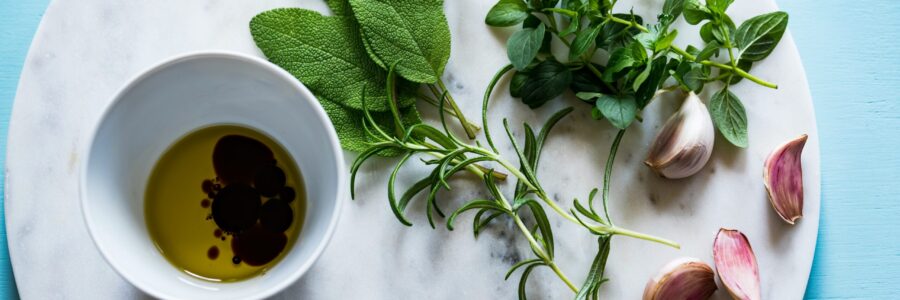If you are looking for a tangy, sweet, robust flavor punch to add to a salad, marinade, or cooked vegetable, balsamic vinegar is a great choice. But not only does it deliver on taste, it also has a few health benefits to boot.
Types of Balsamic Vinegars
Traditional balsamic vinegar is regulated by the European Union, and must contain only 100% grapes from the Modena or Reggio Emilia regions in Italy. It must be processed in a specific way and aged in wooden casks for a minimum of 12 years. Traditional balsamic vinegar can be thick, almost syrupy, and is the most expensive variety.
However, you can also find affordable imported or domestic commercial grade balsamic vinegars in most large grocery stores. There is also a white balsamic vinegar that is clear, milder and a bit sweet, and great on fruit salads.
If you’d like to experiment, you can also try flavored balsamic vinegars. While you can find some flavors at the grocery store, specialty oil and vinegar stores are popping up everywhere. Popular flavors are raspberry, or lemon, or herby flavors like basil or oregano. But you can find more exotic flavors like fig, pineapple, or coconut-lime.
The great thing is that most stores will allow you to taste the vinegar before you buy. Sampling vinegars is so much fun, you’ll never pass an oil and vinegar store again without stepping inside for a taste. Many farmer’s markets also have booths with flavored vinegars, too.
How do you use flavored balsamic vinegar? Here are some great recipes to get you started.
Why Vinegar Can Be Good for You
When eaten as part of a meal, balsamic and other vinegars show an antiglycemic effect, meaning they help regulate spikes in blood sugar after eating. This can help you feel satiated longer, and prevent mood swings that happen when blood sugar spikes and dips. The increased satiation may be one reason vinegar is credited with helping weight loss.
Balsamic vinegar also contains natural acetic acid that in turn contains probiotics. Probiotic rich acetic acid can aid digestion and help maintain healthy gut flora.
Balsamic vinegar also contains antioxidants, antimicrobials, and beneficial polyphenols, all of which can help maintain good health. There’s some evidence that it can help reduce blood pressure, and aid in healthy blood circulation. It’s often used in Mediterranean countries as part of a heart-healthy Mediterranean diet, one of the best diets for longevity and wellness.
Adding balsamic vinegar as a condiment to salads, marinades, fruits, and vegetables can provide fat-free, sugar-free flavor that may reduce the need for additional fats, oils, sugars, or processed dressings.
If you want a great way to include the health benefits of balsamic vinegar, try a splash of a flavored vinegar in your water. You’ll get all of the vinegar’s polyphenols and antioxidants and the flavor may help you drink more water during the day.
Balsamic Vinegar and Skin Health
The antioxidants, antimicrobials, and beneficial polyphenols in balsamic vinegar are all helpful for your skin’s health, and why some claim that adding balsamic vinegar to their diet helps them maintain a healthy and glowing complexion.
While some people successfully treat minor skin irritations with topical dilutions of vinegar (minor itching, sunburn, or swapping a vinegar solution for a topical toner or cleanser in the case of acne), balsamic vinegar would not be a good choice to use topically as it can stain your skin and clothing. Like with any product you use on your skin, if you want to try a vinegar solution, be sure to dilute it first and test it on a small patch of skin. It can sting quite a bit, or may cause a reaction for those with sensitive skin.
As with many healthy additions to a varied diet, more is not always better. Drinking or using straight balsamic vinegar can irritate your throat and stomach lining, and in some cases cause heartburn. That’s why it works and tastes best as a condiment combined with healthy foods and healthy fats like olive oil.
The acids in vinegars, including balsamic vinegar, can damage your tooth enamel. So be sure to rinse your mouth by drinking some water after eating vinegary foods, and wait about an hour before you brush your teeth after eating.
Conclusion
Including time-tested natural ingredients and whole foods in your diet is one of the best things you can do to support your overall health and the health of your skin. Balsamic vinegar is one such addition to your pantry that’s flavorful, versatile, and brings a number of nutritional benefits.
Want to Learn More About Skin Health?
Click HERE to get the Amethyst Holistic Skin Solutions Newsletter. You’ll receive interesting information about skin health via articles, before/after pictures, case studies of Amethyst patients, videos, interviews and more. Feel free to share this article with someone who you think may benefit.
About the Author
Olivia Hsu Friedman, LAc, Dipl.OM, DACM, Cert. TCMDerm, is the owner of Amethyst Holistic Skin Solutions and treats Acne, Eczema, Psoriasis, and TSW. Olivia treats patients via video conferencing using only herbal medicine. Olivia is Chair of the Board of Directors of the American Society of Acupuncturists, serves on the Advisory Board of LearnSkin, and is a faculty member of the Chicago Integrative Eczema Group sponsored by the National Eczema Association.



